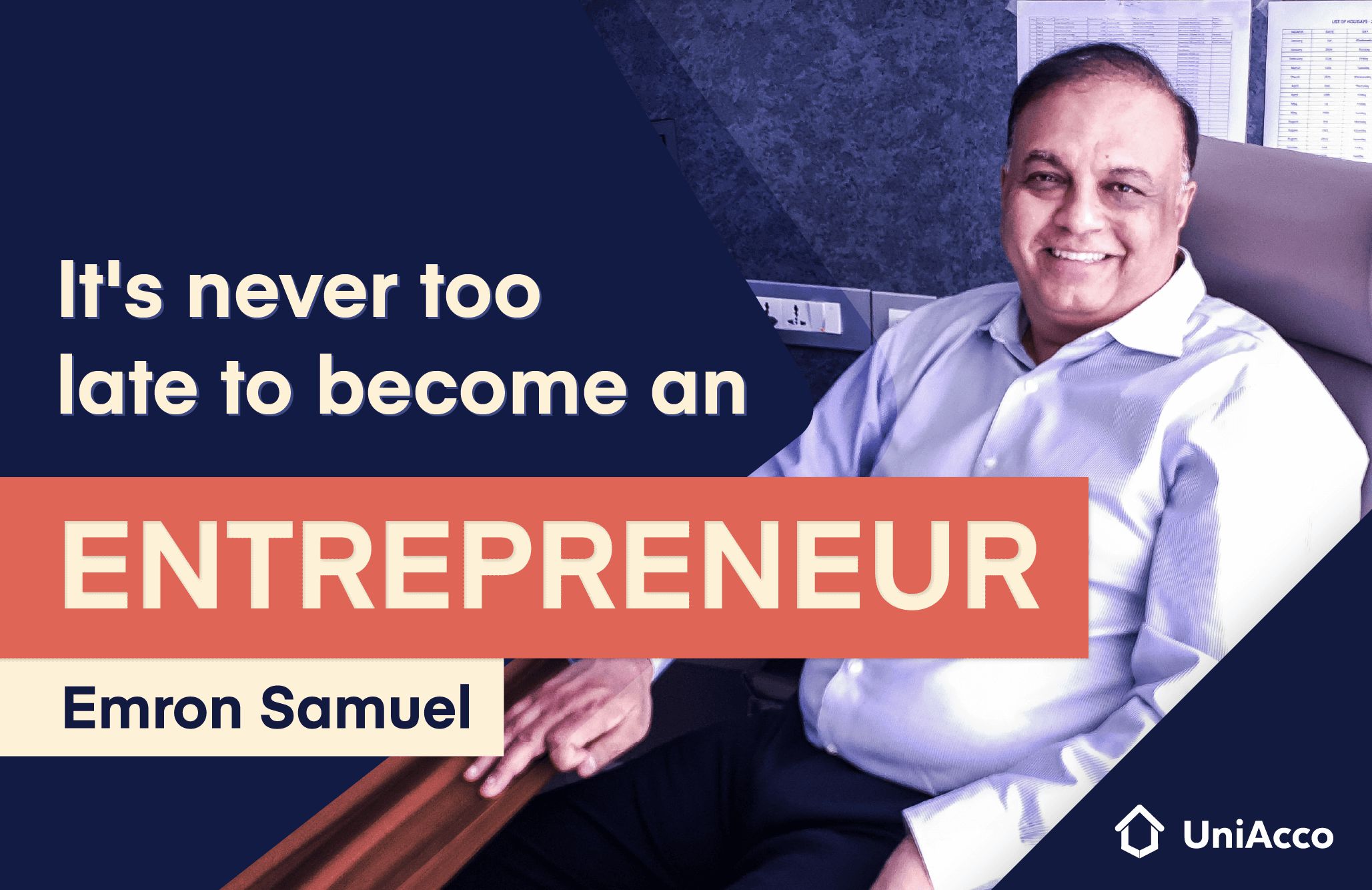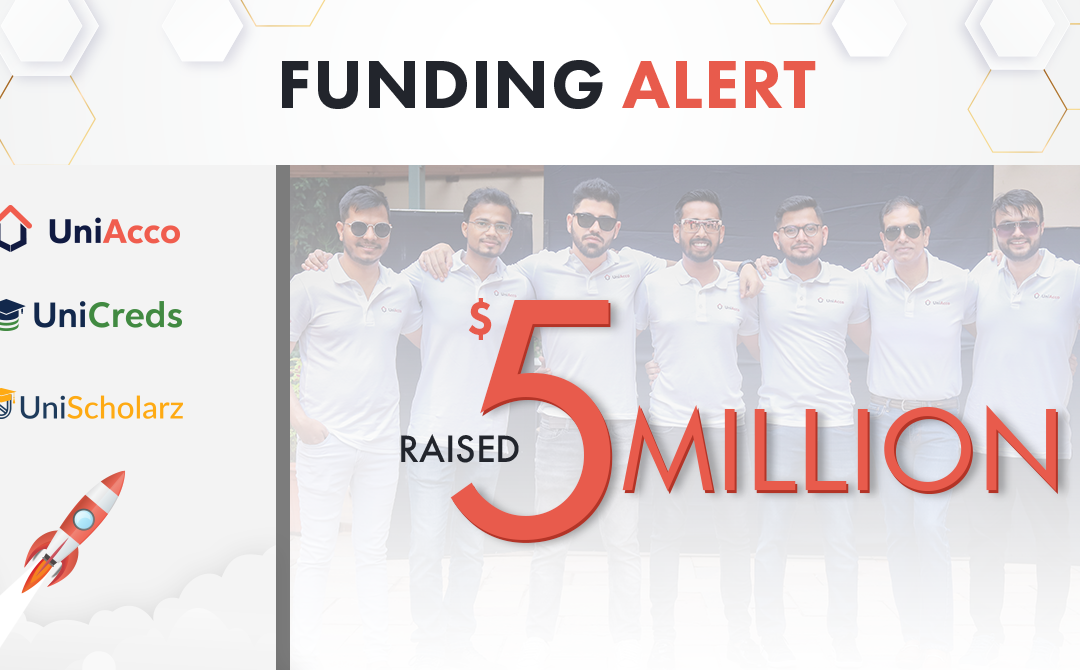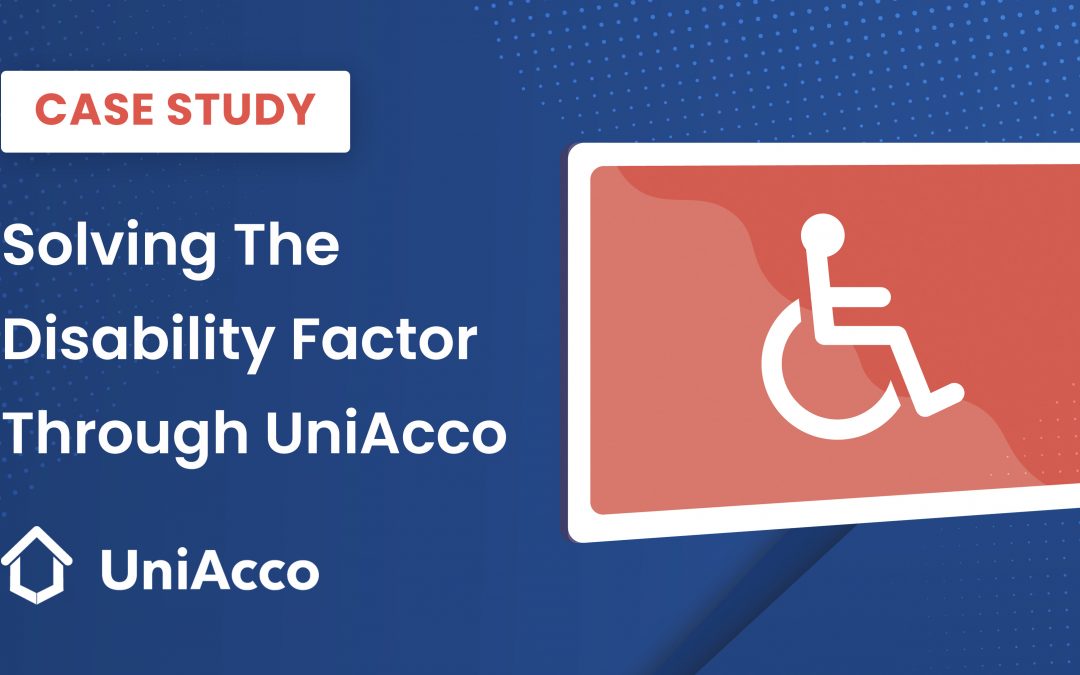What are some of the things you’d want in life?
A fancy car? Check. A large corner office? Check. A luxurious farm-house? Check.
Emron Samuel is a man who has it all. His distinguished career boasts many high-profile positions at a several renowned MNC’s. Placing great emphasis on personal growth, skills development and cooperation with other people, he climbed the corporate ladder and reached positions many of us would envy. But all that wasn’t enough to pacify the ultra-ambitious Emron Samuel. After years of working in the corporate world, he felt the urge to start something of his own. That’s when the entrepreneur bug bit him.
To know Emron Samuel, you need to know about his work ethic. Expect to see him already at work when you come in, and best rest assured to see him wave back at you when you leave the office at 8 pm. For a man who makes his own working hours, his work ethic is definitely second to none. But that doesn’t make him a complete workaholic. He has a simple mantra of grinding during the weekdays and relaxing during the weekends. Sure, his idea of “relaxing during the weekends” has undergone a massive metamorphosis from running for modelling shoots during his younger days, to now, driving his family to a nice quiet dinner.
The interview has been edited for brevity and clarity.
Q) When you decided to pursue Chartered Accountancy, did you think you’d become an entrepreneur?
Emron – Not at all! I come from a modest middle-class family. My main aim was to secure a stable well paying job to provide for my family. Back in the early ’90s, the only professions that met this criterion were a doctor, an engineer and a chartered accountant. In school, I always dreaded science as a subject, so I knew that the science faculty was not for me. But I did discover my love for numbers and realised that commerce would be the best fit for me. The whole concept of an “entrepreneur” was alien to me.
Q) Jews are known to be shrewd businessmen. Being one of the handful of Jews in Mumbai, did this community have any influence on you to be an entrepreneur?
Emron – Not really. My family never pushed me to start a new business. They were very supportive of my decision to pursue chartered accountancy as they knew it was something I’d be good at.
Q) You have worked at a number of big corporate companies like Standard Chartered, IDFC, Grindlays Bank, among others. Tell us what is it like working in such a corporate culture, and what sets it apart from the culture of a start-up like UniAcco?
Emron – Corporates and start-ups have their own sets of pros and cons. I’ve noticed that life at a corporate company is much more process-driven. Foreign corporates, in particular, are ridiculously meticulous. Greater impetus is given to documentation than efficiency, whereas it is just the opposite in a start-up. In a start-up, decisions can be taken and implemented within a matter of hours. You don’t find this level of freedom and efficiency in a corporate setting. For instance, to get leave at a corporate company, I had to make a formal leave application that had to be approved by a whole chain of command. In a start-up, this process is not as strenuous. But at the same time, corporates do a great job of keeping things organised. Details of every transaction, meeting, conference, seminar etc. are expertly documented. Whereas in a start-up, there might be lapses in documentation that may lead to chaos.
Q) You are a Chartered Accountant, but your work revolves mainly around sales and marketing. How did that transition happen?
Emron – Back in ’93, it was axiomatic that chartered accountants are good with numbers and MBA graduates are good at presentation. I consider myself lucky for having a good relationship with numbers and the gift of the gab. That’s why pivoting from finance to marketing wasn’t all that difficult. But truth be told, I had to really hone my soft skills to reach the level of fluency I have today. Till I was in the 12th grade, I was deathly afraid of speaking in front of a crowd. This probably stemmed from an incident I had back in school where I completely decimated a simple one-liner at a school play. This scarred me for life, which forced me to take refuge in being a ‘tree’ in subsequent school plays. I knew I had to overcome this dilemma and regain my confidence. This led me to regularly practice my diction by spending hours in front of a mirror, pronouncing the same word repeatedly. After graduating, I took part in group discussions that did wonders for me. With the spotlight no longer on only one person, it eased the pressure on me and I was able to speak freely. I advise all young professionals who are looking to gain confidence in public speaking to start attending group discussions. It will really help you develop the confidence to speak in a crowd and also teach you how to put your point across more eloquently.
Q) Tell us about your first entrepreneurial experience.
Emron – The reason I decided to take the plunge into the entrepreneurial world was that my job was getting too monotonous. With my learnings reaching an impasse, I realised that it was time for a change. Leaving a really good post at a multinational company was definitely a scary decision, but deep down, I knew that this was the right decision. I teamed up with my colleague and good friend, Amit Singh, to start a new company called Securia Capital Advisors Private Limited. We make a great team because of our complementing skill sets and penchant for getting things done at any cost. When you have a partner with the same level of determination and ambition as you, things get easier.
Q) You are involved in the education sector. With the pandemic rise of coronavirus, students are forced to stay at home and miss school. Are there any ways to get around this problem? Perhaps tele-learning?
Emron – I think the world is gearing towards a completely online teaching pedagogy. With the outbreak of coronavirus, many Chinese companies have deployed “tele-learning” software that enables students to learn from home. This prevents students from missing a huge part of their learning curriculum. In India too, many edtech companies like Byju’s have expanded their services from basic school curriculum to professionals exams like CAT. This shows the trend that online education is growing more popular each day. That being said, I don’t think every child will take kindly to online education. A teacher’s personal touch gets lost in e-learning. When I look back at my school days, I genuinely cherish the manner in which my teachers taught me. That’s why I believe that the best teaching model is a blend of online and offline teaching.
Q) You’ve had tremendous success in your career so far. Do you have any secret or tip you’d like to share with working professionals who want to make it big in their careers?
Emron – The recipe for success was, is and will always be the same – ‘Hard work’. I know this is the most cliched answer to this question, but it’s the truth. When I started my job as a newly qualified chartered accountant, I spent 16-18 days a month travelling around the country speaking to various stakeholders. Working 12-hour shifts were routine for me. But I never complained because I strongly believed that all this hard work would pay off in the future. And it sure did. I eventually went on to head the entire Sales and Marketing team for Standard Chartered Bank that spanned across 34 cities across India. That’s why I advise young professionals to never shun away from hard work as it is your ticket to success. I also believe that the first 10 years of your professional life should be utilised in getting hands-on experience in various facets of a business. This will help identify where your passions lie. Once you find this out, you should hone your skills so that by the time you’re 45-50 years old, you’re an expert in your field and making good money.
Q) They say that an entrepreneurs journey is not without its pitfalls. Is there any incident you remember where you really struggled?
Emron – One of the glaring problems about being an entrepreneur is where will that monthly income come from? Starting a new enterprise is extremely difficult as the scope for immediate returns is almost negligible. It is normal for a start-up to break-even only after the first 2-3 years. I gave myself 3 years to earn a monthly income as much as my corporate job. Luckily I’ve been doing just fine as it’s been 10 whole years since I last had a job!
Q) You’ve invested in several sectors. What makes the student accommodation sector so special? and what made you invest in UniAcco?
Emron – Everyone knows that the journey to a good life is getting a good education. That is why the education sector is one of the most recession-proof sectors in the world. With rapid advancements in technology, the world is getting closer day by day. As a result, travelling abroad for education has become more widespread. This means that there will always be a perennial demand for top quality and affordable accommodation options. This is what makes the student accommodation sector so attractive. The reason I invested in UniAcco is because of their clear vision and mission to become the best cross-border student accommodation platform. It is also helmed by the very capable – Amit Singh and Sayantan Biswas, who are supported by a young and energetic team.
Q) You don’t have a strong digital presence. How do you manage your networking?
Emron – That’s true. I am not on Facebook. I joined LinkedIn in 2009 and have an astounding number of connection(s) – 1 (laughs). I come from an old school of thought where connecting means actually meeting someone face to face. Don’t get me wrong, being on social media is great, but I personally feel that nothing can replace that personal touch you get from meeting someone. I’m also not a big believer in texting. If I need something from someone, I pick up my phone and call them. Calling lets you express yourself more freely and makes the recipient feel more special. For instance, if 100 people wish you a happy birthday on WhatsApp but 1 person calls you to wish you, which one will be more memorable? Of course, the person who called you. That’s why I don’t have a strong digital presence as all my networking happens through my mobile’s keypad.
Q) When someone thinks of Standard Chartered Bank, they instantly think about the marathon. Did you have a hand to play in that?
Emron – Yes. I am proud to have been a part of that 4-member group that was responsible for getting Standard Chartered associated with the Mumbai marathon. The aim behind this move was to improve goodwill by having the name “Standard Chartered” being affiliated to a noble event like the Mumbai marathon. At the time, the concept of “marathon” was still very new in Mumbai. But we believed that this move would be a big hit and executed it on a huge scale. So much so, we managed to get Michael Duane Johnson, retired gold medal Olympic sprinter to be the brand ambassador.











You know a whole lot its almost tough to
argue with you (not that I personally would want to…HaHa).
You certainly put a fresh spin on a topic that has been discussed for
many years. Great stuff, just excellent!